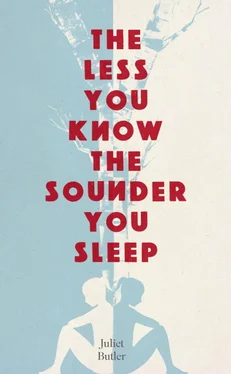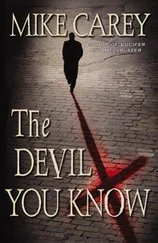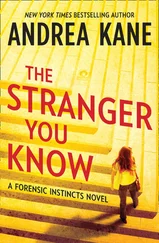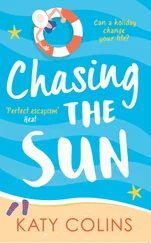I bite my lip. I can feel Masha tensing all through me. She still has her fist in her mouth.
‘Just imagine,’ Lydia Mikhailovna goes on, and I’m thinking: Please stop! Stop! It’s not true, you don’t know us, Masha’s strong and brave. I need her! ‘Just imagine… what it would be like to be joined forever, for every minute and second of your life, to someone who cannot and will not empathize with you, or indeed anyone else. Someone who genuinely sees you as a spineless, weak attachment whose only use is to do your bidding night and day. You and I, Pyotr Kuzmich, choose the ones we wish to spend our lives with, and if we are irritated by them, we go into another room to get away. How that poor child stays sane is something I will never fathom. Every moment of her life she must repress her own feelings, suppress her every desire, subjugate herself constantly to an egotistical, self-seeking psychopath!’
I bite my lip so hard I can taste blood. Masha’s burning up. If she jumps up and starts yelling, we’re done.
‘Well now, yes, Lydia Mikhailovna, I can see, from a human point of view, a psychological point of view, Dasha is the one who suffers most. As the logical one she understands their relationship is symbiotic. Certainly, Masha is headstrong and impetuous, so Dasha must be compliant and submissive. But what interests me, as you may have seen from the dissertation, what interests me most, is pain sensitivity.’
‘Pain sensitivity?’
‘Yes, yes, pain sensitivity. It appears that when an organism suffers constant levels of pain and trauma throughout its early years, then the pain threshold is considerably raised in later years and that organism becomes almost inured to pain. In addition, yes, in addition, the memory of that trauma can in fact be completely wiped out – as we have seen with the twins. Quite remarkable that their recollections of their time in the Paediatric Institute are so very selective – indeed, they seem to have no recall at all of the daily um… procedures.’
‘I’m afraid we have no knowledge of your experiments either. Having not been informed of them – which I must say, I view as an omission,’ says Lydia Mikhailovna coldly. Masha’s still furious. She’s taken her fist out of her mouth and now both of them are balled up stiffly at her sides like hand grenades about to go off. ‘And we have not had access to the dissertation, as I believe it is kept at Red Level in the Academy of Medical Sciences. I did make enquiries.’
‘Ah, of course, of course, our red, secret classification… well, well, never mind. Suffice to say that they both have a remarkably high pain threshold. The appendicitis incident, where Dasha scarcely complained despite the appendix having burst… And the helmets, yes, in fact one of my students tried out the neuro-helmets and almost flew through the roof, yet the girls are very tolerant of them. Very tolerant indeed.’
‘I believe it’s more the anticipation of pain, Pyotr Kuzmich, which causes Dasha’s suffering.’ It’s Aunty Nadya. ‘Rather than the suffering itself.’
‘Well yes, Nadya, yes, she’s a sensitive soul in that way, our Dashinka. However, let’s get down to business. The reason I’m here is because my team would like to conduct a few more, aaah, procedures to test their pain sensitivity now they are young adults.’
I gulp and look at Masha. She’s biting her thumb. What procedures? What does he mean?
‘It would only take a few weeks, perhaps just a week, a matter of a scratch with a scalpel here and there, electric shocks, burning and freezing – you know, very similar to what we did to them back in the Paediatric Institute – and then we could monitor their… aah… levels of discomfort as teens. Hmm? As compared to early childhood?’
Lydia Mikhailovna puts on her quiet, icy voice.
‘Am I to understand that these electric shocks and freezing and… and burning, were the norm for them in the Paediatric Institute?’
There’s a slight pause.
‘Well, not norm, of course,’ he says eventually. ‘But that was certainly part of the research that we would like to follow on with now. For comparison, you understand.’
Masha and me look at each other.
‘We would have to consult with Professor Popov,’ says Lydia Mikhailovna.
‘ Aaakh , Popov! The man is not a true scientist, Lydia Mikhailovna! Forgive me, but we Soviets have just stepped in to prevent a Third World War. Great times demand great feats. We cannot afford to give way to bourgeois sentimentality and fallibility. No, we must not be accused of—’
‘But, Pyotr Kuzmich!’ Aunty Nadya speaks up, sounding a bit scared, but also upset. ‘Could you not conduct these experiments on your dogs?’
‘Dogs, Nadya, are rarely born conjoined, and cannot rate pain on a scale of 1 to 5. We require a pain-threshold experiment with human conjoined twins. These are the only living pair in the Soviet Union.’
I frown. Conjoined? What’s conjoined mean? I’ve never heard that word before.
‘But these are children, Pyotr Kuzmich… little girls,’ goes on Aunty Nadya.
‘Not exactly children, are they, Nadya? Not real children? And I fear your love for them is clouding your reason and the aims of Soviet science—’
‘You’re wrong. I don’t love them,’ she says, clear as anything. ‘They’re not my own children, are they? Not my own flesh and blood. I pity them. I just feel pity for them. As I do to all my patients. Even scientists should feel pity, Pyotr Kuzmich.’
We stay sitting there for a bit after they’ve all gone and after we’ve heard their feet tapping off down the corridor. We just sit there, not talking.
‘See,’ says Masha, after a bit. ‘Told you she didn’t love us. You and your stupid mummies and aunties.’
‘Yes, Masha.’
‘If she doesn’t need us, we don’t need her.’
‘No, Masha.’
‘Psychopath, am I?’
‘No, no, Masha. That’s just Lydia Mikhailovna being crazy. She doesn’t understand.’
‘Inferior intelligence, am I?’
‘No, Masha, no, no, you’re the boss. They don’t understand. I need you. Being tough is better than knowing your times-tables, right?’
She gets up then, and puts her arm round my neck for balance. I put mine round hers for balance too. And we walk right out and back to the ward.
Olessya writes again and Aunty Nadya adopts someone who isn’t us
It’s so healthy here. They’re taking us on holiday by a river to stay in a camp in the woods for three months. We fish and cook our own food on fires and play all the time. You should come for the next school year. Can you?
We’re sitting on our bed playing cat’s cradle with our shoelaces, looking at Olessya’s postcard for the millionth time. All the kids are hiding under their beds again because Masha told them we had magic powers to split their heads in half, like us, and make them all become our together-twin slaves, with right and left parts of their brains. She has a stick, which she says is a wand, and if she strikes them with it, they’ll divide into two, with a lightning bolt – like we were. So it’s quiet as anything. It’s so odd, to think we we’re actually one person divided into two parts of our brain, but I’ll try not to think of that. I’ll think of the postcard instead.
We’re still sitting looking at it when Aunty Nadya comes in.
‘I have something to tell you, girls,’ she says, looking around at the empty ward with all the little feet sticking out from under the beds. She shakes her head wearily and sits down. ‘It’s about Vasya – you know, Uncle Vasya’s little nephew. I’ve brought him in a few times, to play.’
‘Prick,’ says Masha, but makes it sound like she’s hiccupping and Aunty Nadya doesn’t even notice.
Читать дальше
Конец ознакомительного отрывка
Купить книгу












